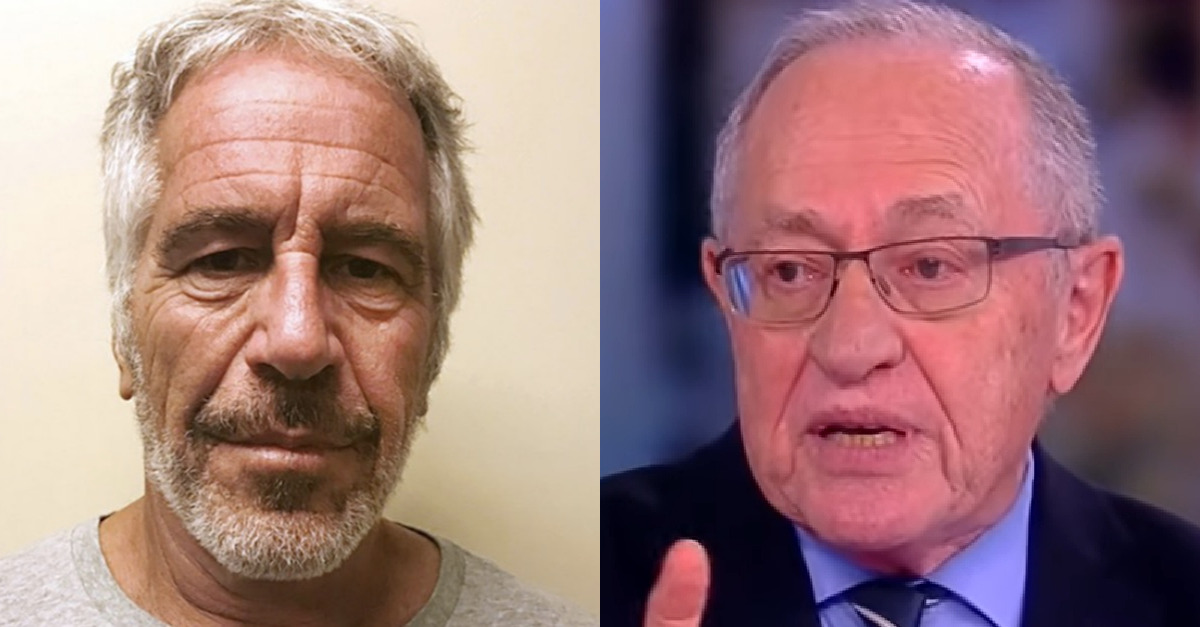
Harvard Law professor emeritus and celebrity attorney Alan Dershowitz was dealt a setback in federal court on Wednesday after repeated efforts to access a full suite of documents related to his former client Jeffrey Epstein were denied.
“Mr. Dershowitz has had several bites at this particular apple,” Senior U.S. District Judge Loretta Preska says at the outset of her order.
Dershowitz has made several failed attempts to modify a years-old protective order in the settled defamation case between Epstein accuser Virginia Roberts Giuffre and alleged Epstein accomplice Ghislaine Maxwell. While the lawsuit between Giuffre and Maxwell was settled in 2015, Giuffre and her legal team have fought for years to unseal the entirety of the documents in that case.
Those documents make up just some of the Epstein files sealed by various courts and are widely believed to contain the names of numerous elites in politics, finance and the arts who presumably took part in the infamous pedophile’s alleged global child sex-trafficking operation.
The process of sealing, unsealing and slowly releasing those documents has long been controlled by a protective order issued by the Southern District of New York (SDNY) in 2016. A high-stakes legal battle has been fought for years to have those documents released to the public on one side–and to have the documents kept under judicial lock and key on the other side–due to the highly sensitive allegations they are widely believed to contain.
Dershowitz has an ongoing defamation case against Giuffre–who also has a defamation case against him–which is a separate legal matter from the long-settled defamation case between Giuffre and Maxwell. (Giuffre sued Dershowitz for defamation in early 2019; Dershowitz counter-sued Giuffre for defamation in late 2019.)
The elite attorney has consistently argued he needs access to all of the Epstein files to wage his continued battle against Giuffre. He has consistently been denied such access by Preska–and third parties have argued against providing Dershowitz such access.
The SDNY’s Wednesday order was no different in this regard. Dershowitz was given another definitive–if not final–reply that the court will not modify the original protective order to give him carte blanche access to the files.
“Most recently, Mr. Dershowitz sought modification of the Maxwell protective order to permit him blanket access to all sealed materials and discovery at issue in the Maxwell litigation, a request that the Court denied,” the order explains. “Core to the court’s conclusion were several issues. First, Mr. Dershowitz’s request was staggeringly overbroad given the relatively constrained facts at issue in the Dershowitz litigation. Second, the proposed modification of the protective order would threaten to undercut the carefully planned unsealing process in Maxwell.”
While Giuffre and her attorneys recently said they were glad to provide Dershowitz with additional information, Judge Preska was troubled by such an agreement based mainly on privacy issues and instead decided to grant a more limited form of accommodation.
“[T]he court will permit modification of the Maxwell protective order to allow limited disclosure to Mr. Dershowitz of sealed documents and testimony that mention Mr. Dershowitz, subject to an exception that is the subject of a sealed order to be provided to Ms.Giuffre,” the court order notes. The court will not permit modification to allow a disclosure to Mr. Dershowitz of sealed materials outside of that universe.”
The primary reason for the denial is that multiple non-parties relied on the original protective order when they previously provided discovery “in [the] contentious litigation.” Giving Dershowitz unfettered access to those sealed materials would be in violation of those non-parties “reliance interests,” Preska determined.
Then there’s the matter of Epstein’s victims themselves—who lobbied the court specifically against Dershowitz learning their information.
Per the ruling:
[T]he gravity of the privacy interests of nonparties–particularly nonparties who are alleged victims of Jeffrey Epstein’s sexual abuse–weighs heavily against the unilateral disclosure that Mr. Dershowitz seeks. Those interests are particularly acute given that the psychological and emotional wellbeing of survivors of alleged sexual assaults may be implicated by such a broad disclosure. Indeed, protecting such interests is one of the core purposes of the unsealing process in Maxwell.
Read Preska’s full order below:
Preska Order in re: Dershowitz Access Request by Law&Crime on Scribd
[images: Epstein via mugshot; Dershowitz via screengrab/The View]
Have a tip we should know? [email protected]